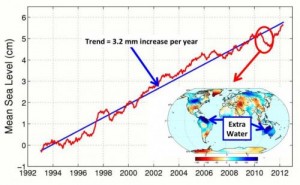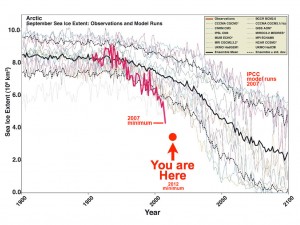I’ve seen a number of interesting articles regarding climate change in the news lately, so figured I’d just sum them up in a single post. As always, follow the links for the full stories.
First, the World Bank has issued a report (PDF link) that finds a very high chance of hitting an average warming of 4°C by the end of this century…twice the international ‘goal’ of 2°C. The report goes into details of why this is bad, but chances are if you’re reading this you already believe it’s bad…what is significant here is that yet another scientific report is showing we’re making too little progress towards combating climate change, and are leaving a pretty messed up world for future generations. (full article at the Washington Post). It’s also worth noting that while the impacts of a 2°C rise have been studied quite a bit, the same scientific scrutiny has not been applied to a 4°C rise. They conclude that, “Given that uncertainty remains about the full nature and scale of impacts, there is also no certainty that adaptation to a 4°C world is possible.” Think about that.
Our neighbors in Canada are feeling a bit better about global warming, as it’s not expected to impact them as negatively (or other northern countries like Russia). (link) The warmer temperatures could even have some benefits…more tourism and increased food production, for example.
In Iowa, more than 130 scientists from Iowa colleges and universities have pointed out the obvious…that the bad drought they experienced this year is a predicted effect of global warming, and that we can and should expect more of the same (or worse) in coming years. (link) I wonder if this will lead to a mass exodus of people moving from the Midwest to Canada?
In light of the news that the US is on track to be a net exporter of energy by 2020, no longer dependent on foreign oil, the IEA warns that
No more that one-third of proven reserves of fossil fuels can be consumed prior to 2050 if the world is to achieve the 2°C goal.
By pursuing energy independence via increased domestic fossil fuel production, we’re also sealing the fate of future generations. (link)
Last, but most certainly not least, is that when you look at global average temperature, October 2012 was above average…but what’s most significant is that this was the 332nd consecutive month where the global average temperature has been at or above average. Remember, there are local variations – some parts of the world may be cooler, some hotter – but globally, the data indicates that this planet is warming up. (link)
I’d like to wrap up this post with advice for how we can stop this, but that’s a real tough one. I’m convinced that the only solution is to provide people with a clean energy alternative at a lower cost. More importantly, we need action fast…which means we need a dramatically lower cost, something that makes everyone rush to adopt this new technology. I’m not aware of any technologies that fit that requirement…and our country lacks the political will to implement change on a national level. Any ideas?
 Check out this chart (from phys.org)…while at first glance it shows the rise in ocean levels over the past twenty years, more importantly, it shows how when it comes to climate, you need to look at multi-year trends, not what’s happening in one particular year. This chart shows that ocean levels actually decreased in 2010-2011, and if you only looked at that fact, you might think that there’s no cause for alarm. However, look at the longer trend and you’ll see a very different story.
Check out this chart (from phys.org)…while at first glance it shows the rise in ocean levels over the past twenty years, more importantly, it shows how when it comes to climate, you need to look at multi-year trends, not what’s happening in one particular year. This chart shows that ocean levels actually decreased in 2010-2011, and if you only looked at that fact, you might think that there’s no cause for alarm. However, look at the longer trend and you’ll see a very different story.

